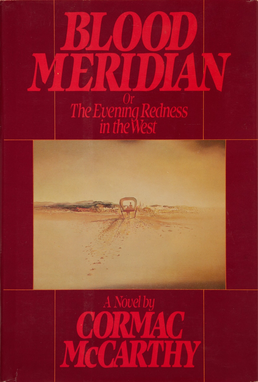Part 17
byPart 17 unfolds as Glanton and a group of twenty-one men, along with a dog and an odd cart containing an idiot in a cage, set off from a small town into the vast desert. The whiskey keg, altered to hold whiskey disguised as water, is a crucial part of their journey. As they depart, the idiot, locked away in the cage, cries out hoarsely at the sun, as if pleading for something he cannot grasp. Glanton, now riding in a new saddle, takes charge of the group, while David Brown, positioned at the rear, wrestles with dark thoughts about abandoning his brother. The group’s interactions with the local savages are transactional, as they trade the disguised whiskey for gold and silver, but Glanton remains uninterested in the exchange, instead choosing to focus solely on the road ahead, unmoved by the complications of their dealings.
They ride westward through the harsh desert, passing the remains of a ruined crockery furnace and witnessing the haunting beauty of saguaro forests beneath a darkening sky. The landscape grows even more desolate as they travel further, with no water in sight, and Glanton reflects on the death and destruction that has come before them. He specifically thinks of the Delawares, all of whom were killed, and it shapes his perspective as he contemplates the future of his journey. That night, as they gather around the campfire, Glanton becomes introspective, reflecting on his own fate and his role within the vast, indifferent universe. He acknowledges his own agency over his future, resolute in his decision to press on, regardless of what lies ahead, knowing that the path before him is fraught with challenges that will test his resolve.
The journey continues, and the group eventually encounters a ragtag group of Mexicans led by Colonel Garcia, who is on a mission to hunt down the Apaches. The Mexicans, dressed in ragged clothes and armed with makeshift weapons, are a far cry from the seasoned fighters Glanton’s group represents. Glanton, observing them, feels a disconnect from their cause, viewing their struggles as insignificant in comparison to his own goals. After parting ways with the Mexicans, Glanton and his men settle for the night, discussing their thoughts on war and the nature of their existence in this brutal world. The judge, ever philosophical, expounds his views on war, stating that it is an eternal force in humanity, one that precedes everything else. He asserts that war is the ultimate validation of man’s worth, a fundamental force intertwined with morality and existence itself. Brown, however, expresses skepticism about the judge’s views, sparking a tense exchange about the complex relationship between war, human nature, and morality.
As they travel across an even drier landscape, the group faces hunger, discomfort, and a growing sense of futility. The judge, however, continues to assert his belief that men are inherently players in the grand game of life, with every conflict and struggle only serving to define their existence. The next day, the group crosses a lava bed, where they discover an ancient femur, marking a symbolic intersection between their current struggles and the distant past. The judge takes a moment to pay homage to time and existence, discussing the greater truths that lie beneath the surface of their journey. His reflections, steeped in a strange sense of reverence for history and the passage of time, contrast with the harsh reality that the group faces. Despite the judge’s philosophical musings, the men remain resolute in their journey, committed to continuing across the unforgiving desert, their path marked by relentless challenges and the constant reminder of their vulnerability in this vast and desolate landscape.

